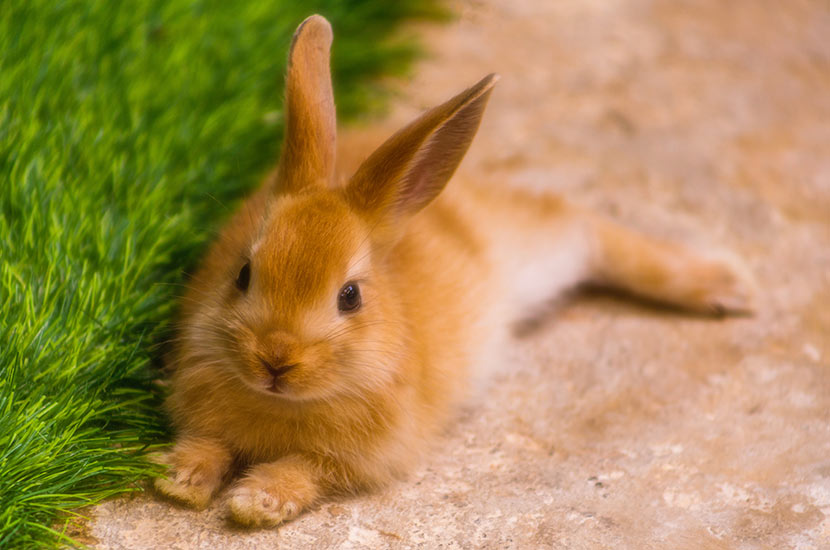Miami , FL
(305) 666- BUNN
Spay or Neuter: The First Step
The most important thing to remember is that your rabbit is very unlikely to retain reliable litter box habits upon reaching sexual maturity unless she is spayed or he is neutered. Sex hormones give a rabbit an uncontrollable desire to mark the territory with urine and specially scented fecal pellets. Spaying or neutering will greatly reduce or eliminate this desire, as well as eliminate the risk of uterine/ovarian cancer and unwanted pregnancy in females. And let us not forget the huge relief from endless sexual frustration that spayed/neutered animals enjoy.
Get the Right Box!
To train your rabbit to use a litter box in a selected area, choose a litter box that is the right size for a bunny. Don’t force a tiny dwarf rabbit to leap into an enormous, high-sided box designed for a gigantic cat- and don’t make your French Lop squeeze his big frame into a toaster sized toilet. The litter box should be comfortable, and located in a quiet, private place.
What Types of Litters Are Safe for Rabbits?
Be sure to use ORGANIC litter in the box. Clay litters- especially clumping litters are inexpensive, but very unhealthy for two reasons. First the inhaled clay dust can cause respiratory problems. Second, when ingested as dust licked off paws or as a crunch treat straight form the box (yes, some of them do it!), the highly dehydrated clay litter sucks vital fluids form the intestine itself and can cause some serious impactions and intestinal slowdowns. Clay litter, when ingested, leads to heavy loads of calcium in the urine (where bunnies eliminate most of their calcium). This can lead to sludging, stones and urinary tract blockage! Recycled newspaper litter is bad. Organic litters include those made from recycled paper products (e.g. Carefresh, Yesterday’s News).
Do not use cedar or pine shavings, as these products produce potent aromatic compounds, which can cause respiratory damage and elevate liver enzymes when inhaled over long periods of time.
Getting Bunny to Use the Box
Now that you have set up a safe, appropriate box, put it in an area where the bunny can be comfortably confined for a few days, except for brief excursions for run and play. You can place the box inside the indoor hutch, tuck it behind the toilet in the bathroom, or place it in a corner of the laundry room. Whatever is convenient for you as well as attractive to the bunny.
Use a baby gate to enclose the bunny in the selected room with his litter box, and be sure to provide plenty of toys, food, water and comfortable places to sleep. This will be bunny’s “home base” and should be as inviting as you can make it. It may take a few days for the bunny to reliably use the box, as he may mark the area thoroughly as he settles in. It may help to soak or sweep up the “accidents” with a bit of tissue and put the tissue in box. He will get the idea! Like cats, most rabbits prefer to do their “business” in a nice, absorbent spot such as a clean litter box.
It often helps to put a handful of timothy hay in a clean corner of the litter box to encourage use of the box. A rabbit will often sit in the box, happily munching at one end, which the processed product comes out the other end. This may seem a bit disgusting to a human, but rabbits don’t consider their feces to be dirty. Some rabbits will even nap in the litter box! As long as the litter box is changed regularly, this should pose no problem: rabbit fecal pellets are hard, dry and relatively odorless. In fact, rabbit litter box leavings are just about the best natural, organic fertilizer you can get for your garden! Grow an herb garden, fertilize with bunny’s litter box leftovers (including the organic litter) and enjoy the ultimate in recycling!
Once your bunny is reliable about using the litter box in his area, you can gradually increase his freedom. Be sure that he can always get back to his litter box when he is free in the house. There is a possibility that he may pick up a second area in the house as a toilet corner. If the behavior continues, even after squirt bottle discipline and white vinegar, you may have to raise the white flag and provide another litter box. The Good News: a bunny’s litter box does not smell if changed regularly.
Healthy stool link

